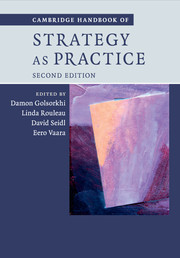Book contents
- Frontmatter
- Contents
- List of figures
- List of tables
- List of boxes
- List of contributors
- Preface to the Second Edition
- Introduction: what is strategy as practice?
- Part I Ontological and Epistemological Questions
- Part II Theoretical Resources: Social Theory
- Part III Theoretical Resources: Organization and Management Theories
- Part IV Methodological Resources
- 24 Using ethnography in strategy-as-practice research
- 25 Researching strategists and their identity in practice: building ‘close-with’ relationships
- 26 Studying strategizing through biographical methods: narratives of practices and life trajectories of practitioners
- 27 Researching everyday practice: the ethnomethodological contribution
- 28 Critical discourse analysis as methodology in strategy-as-practice research
- 29 Studying strategy as practice through historical methods
- 30 Quantitative methods in strategy-as-practice research
- Part V Substantive Topic Areas
- Index
- References
28 - Critical discourse analysis as methodology in strategy-as-practice research
from Part IV - Methodological Resources
Published online by Cambridge University Press: 05 October 2015
- Frontmatter
- Contents
- List of figures
- List of tables
- List of boxes
- List of contributors
- Preface to the Second Edition
- Introduction: what is strategy as practice?
- Part I Ontological and Epistemological Questions
- Part II Theoretical Resources: Social Theory
- Part III Theoretical Resources: Organization and Management Theories
- Part IV Methodological Resources
- 24 Using ethnography in strategy-as-practice research
- 25 Researching strategists and their identity in practice: building ‘close-with’ relationships
- 26 Studying strategizing through biographical methods: narratives of practices and life trajectories of practitioners
- 27 Researching everyday practice: the ethnomethodological contribution
- 28 Critical discourse analysis as methodology in strategy-as-practice research
- 29 Studying strategy as practice through historical methods
- 30 Quantitative methods in strategy-as-practice research
- Part V Substantive Topic Areas
- Index
- References
Summary
Introduction
In recent years scholars have started to pay attention to the discursive aspects of strategizing (Knights and Morgan 1991; Hendry 2000; Samra-Fredericks 2005; Seidl 2007; Balogun et al. 2014). These studies have highlighted the underlying assumptions of strategy as a body of knowledge (Knights and Morgan 1991), the central role of narratives and other discourse forms in organizations (Barry and Elmes 1997), the importance of rhetorical skills in strategizing (Samra-Fredericks 2003; 2005) and the implications that specific conceptions of strategy have on identity and power (Ezzamel and Willmott 2008; Mantere and Vaara 2008; McCabe 2010). This stream of research can be understood as part of the more general interest in the social and organization practices around strategy, although some scholars have argued that the strategy-as-practice movement has not been able to incorporate or develop original critical discursive perspectives on strategy (Clegg, Carter and Kornberger 2004; Carter, Clegg and Kornberger 2008). In the following I take a broad perspective and focus on the issue of how we can better understand the discursive aspects of strategy and strategizing from a critical angle. My intention is to try to refrain from constructing barriers between SAP studies and critical discursive analyses, as such barriers would do a disservice both to the development of strategy as practice and to the promotion of critical analysis of strategy as discourse and practice.
The purpose of this chapter is to explain how critical discourse analysis can serve to further our understanding of strategy and strategizing. CDA is a methodological approach that allows one to examine the constitutive role that discourses play in contemporary society. Its origins lie in applied linguistics (Fairclough 2003; van Dijk 1998; Wodak and Meyer 2002), and this is why it emphasizes the central role of texts and their analysis more than other approaches – such as Foucauldian and other post-structuralist methodologies – in discourse analysis. Unlike some other linguistic methods, however, CDA underlines the linkage between discursive and other social practices, thus not reducing everything to discourse, as is the danger with some relativist forms of discourse analysis. In brief, I argue that it is precisely through such an approach that we can better map out and understand the role of discursive practices in the micro-level processes and activities constituting strategies and strategizing in contemporary organizations.
- Type
- Chapter
- Information
- Cambridge Handbook of Strategy as Practice , pp. 491 - 505Publisher: Cambridge University PressPrint publication year: 2015
References
- 7
- Cited by



